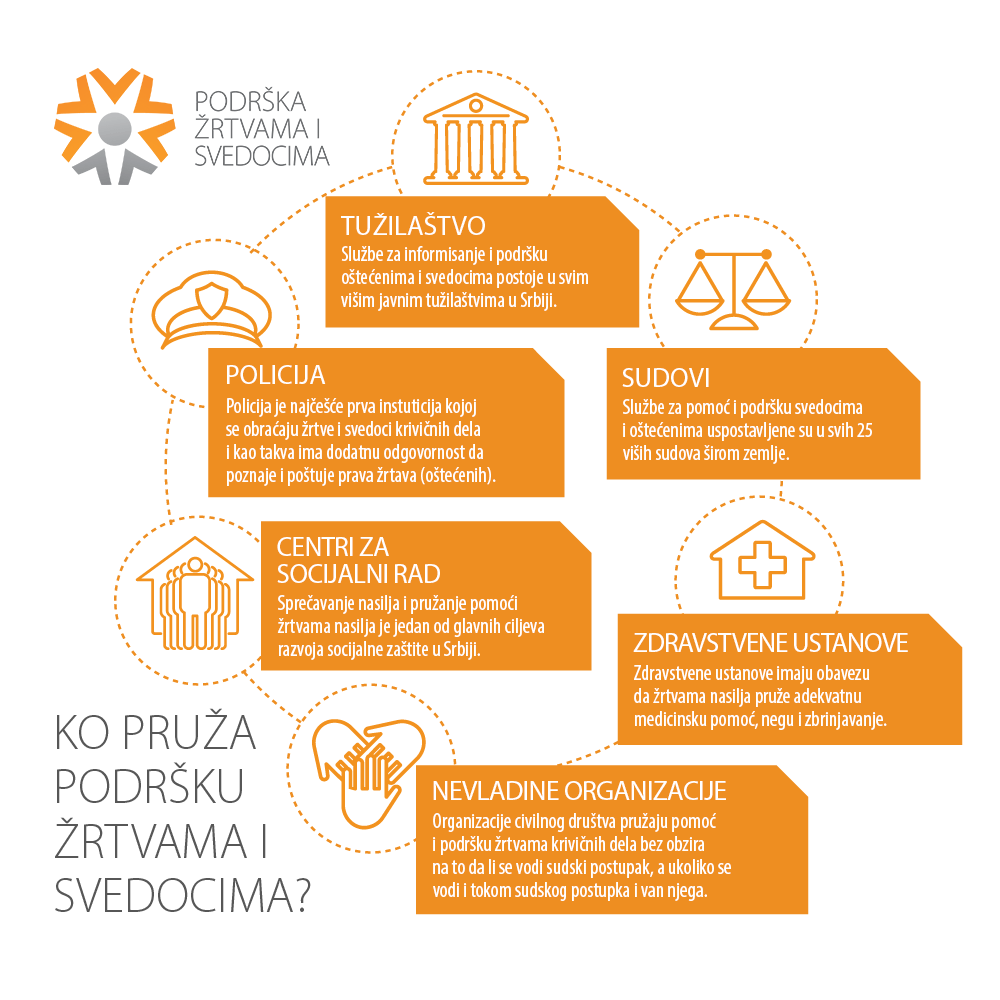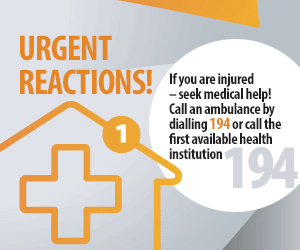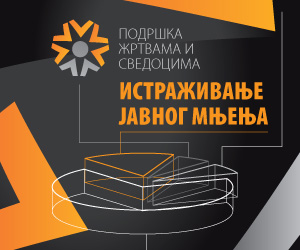Victims and witnesses of crimes are entitled to help and support, and this is not an obligation of just the state, but also of the entire society. In life, however, the victims’ problems often continue after the crime itself. That is why it is important to establish a comprehensive national system of support for victims and witnesses, and to raise awareness about EXISTING SUPPORT AND HELP.
The spectrum of relevant institutions which should be involved in the provision of support to victims and witnesses is broad, but the crucial actors are the judiciary and other public institutions and bodies, as well as civil society organisations.

Police
Police is tasked with protecting and improving the safety of citizens and property, respecting human and minority rights and freedoms guaranteed by the Constitution, and other protected values of a democratic society.
Police is usually the first institution which victims and witnesses of crime contact, and as such it has additional responsibility to know and respect the rights of victims (injured parties). By acting without bias, empathetically and professionally, it is obligated to inform victims and witnesses about the rights they have and in accordance with that, refer them to specialised services, institutions and organisations which provide support to victims and witnesses, in the fields of healthcare, prosecution, courts, social services, local administrations and NGOs.
Police can be contacted at any time by calling 192, or in the event of domestic violence, there is a special SOS line 0800100600.
Prosecution
Services for information and support for victims exist in all Higher Prosecutor’s Offices in Serbia, the Organised Crime Prosecutor’s Office, the War Crimes Prosecutor’s Office and the First Basic Prosecutor’s Office in Belgrade.
The reason for their existence is to place the focus on injured parties, i.e. victims of crimes, and to provide them with information and logistical support, to make their participation in the proceedings easier and to prevent secondary victimisation. The objective of the employees in these services is to act with integrity, without bias and with confidentiality.
The role of these services is extremely important, particularly in the investigation phase. Every victim and witness should be offered the chance to express their needs, concerns and expectations. From these services, victims and witnesses are supposed to receive information about rights and the roles of victims/injured parties in the proceedings (including explanations of legal terms) and, if needed, to be refered to other institutions which can offer them support, including temporary accommodation in safe houses.
Prosecutors should be careful to ensure that victims and witnesses are not exposed to psychological trauma and repeat (secondary) victimisation during the investigation and trial.
If a victim or witness fears for their safety, the employees of support services at prosecutor’s offices shall direct them to an interview with the deputy public prosecutor, who will take further steps to ensure protection measures.
Victims and witnesses may also be given security and special measures when arriving at the prosecutor’s office and court buildings, as these services cooperate with the judicial guard force.
Courts
Help and Support Services for Witnesses and Injured Parties have been established in all of 25 Higher Court instances across the country.
The purpose of this Service is to provide emotional and logistic help and support to witnesses and injured parties before, during and after their testimony.
The Help and Support Service established in a Higher Court can provide support in proceedings led before a lower court.
The Help and Support Service for Witnesses and Injured Parties performs its tasks directly and with engagement of trained volunteers.
Help and support for the victims/witnesses is provided by disseminating information about the rights of victims, legal terminology and other relevant legal information related to the procedure (explanation of roles in criminal proceedings, manner in which the questions are asked before the court, charging of travel costs, and similar). The Services also provide all pieces of legal information related to testifying, including the ones concerning the organisation of hearing the witness and the injured party in a special room with audio and video transmission, and without the presence of other parties and participants in criminal proceedings.
Injured parties and witnesses cannot speak with an employee at the Service about the contents of their statement to the court, and they cannot receive legal advice related to the testimony itself, with the exception of general legal information about the procedure before the court.
The designated judge assesses which witnesses require help and support through the work of this Service, and the record-keeper or a court assistant submits a written notification of such duly summoned witnesses to the Service. The Service gets this notification in a form of memo which contains information about the time and date of the scheduled hearing, number of the case with the order of the witnesses to be heard, and a notification on whether confrontation between two witnesses is planned, whether the witness has been given protection, as well as general information about the witness. For the purpose of timely submission of information to the witnesses, the record-keepers also notify the Service about any changes that may be related to witnesses (delays of hearing, rescheduling, change of the courtroom in which the hearing is to be held, and similar).
The Service will promptly notify the designated judge about illness or other reasons for the witness failing to appear in court, need for a companion and any other significant information, as well as about witness’ request for attribution of procedural protection measures, their state (exaltation, aggression, fear, health condition), existence of a threat before and after the testimony, and about actions taken by the Service.
The employees working at the Service cannot be questioned as witnesses themselves before the court in a specific case related to their work with the witnesses.
Social Services Centres
Violence prevention and support for victims of violence are some of the main goals of social protection development in Serbia. Social Services Centres have many authorities and mechanisms with which they can provide support to victims and witnesses, and certainly to inform them about their rights, to initiate coordinated actions of competent bodies, give recommendations to implement protection measures and secure specialised support for them, which include accommodation in safe houses.
Safe houses and shelters for victims of violence exist in a certain number of Social Services Centres, and when it comes to securing safe accommodation, the Centres cooperate with NGOs as well.
Since 2012, within the framework of the social protection system, the Centre for Protection of Victims of Human Trafficking has been conducting the evaluation of the condition, needs, strength and risks of victims of human trafficking, their identification and the securing of assistance and support for victims of human trafficking, for the purpose of their recovery and reintegration. To receive reports of suspected cases of human trafficking, the Centre has opened a hotline: +381 (0)63 610 590.
Healthcare institutions
Healthcare institutions are obligated to provide adequate medical assistance, care and hospitalisation to victims of violence. Healthcare workers are also obligated to perform the initial risk assessment and act in accordance with it. It is the official responsibility of healthcare workers to report cases of violence to the police and the prosecution.


Non-governmental organisations
Non-governmental organisations (civil society organisations) provide help and support to victims of crimes regardless of whether there is an ongoing court procedure, and if there is, during the court procedure and outside of it. Some NGOs provide support to victims of all crimes, and some of them are specialised for support to certain groups of victims of crimes (usually the particularly sensitive and marginalised groups).
The most common forms of help and support provided by NGOs are: information, emotional support and counseling, directing victims to relevant specialist organisations for victim support and establishing contact with other institutions.
Certain NGOs also offer specialist services such as legal aid and support (preparation for trial, going to court and support during the procedure), psychological support and psychotherapy, and a number of them also provides accommodation for victims (especially for women and children who are victims of violence).
Interactive maps of support providers
http://www.interaktivnamapa.rs/ - directory of organizations, services and institutions that provide help and support to victims of crimes in Serbia
https://www.zeneprotivnasilja.net/o-nama/mapa-organizacija - map of women's NGOs that provide free, individual support to female survivors of male violence in Serbia









